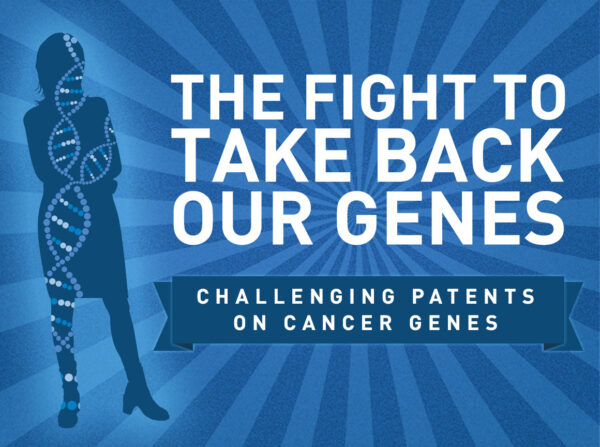Supreme Court Hears Arguments Challenging Patents on Breast and Ovarian Cancer Genes
FOR IMMEDIATE RELEASE
CONTACT: (212) 549-2666; media@aclu.org
WASHINGTON – The U.S. Supreme Court heard arguments today in a case seeking to invalidate patents on two genes associated with hereditary breast and ovarian cancer.
The lawsuit was filed by the American Civil Liberties Union and the Public Patent Foundation (PUBPAT) on behalf of researchers, genetic counselors, patients, breast cancer and women's health groups, and medical professional associations representing 150,000 geneticists, pathologists and laboratory professionals. The patents allow a Utah company, Myriad Genetics, to control access to the genes, thereby enabling them to limit others from doing research or diagnostic testing of the genes, which can be crucial for individuals making important medical decisions.
"Myriad did not invent the human genes at issue in this case, and they should not be allowed to patent them. The patent system was designed to encourage innovation, not stifle scientific research and the free exchange of ideas, which is what these patents do," said attorney Chris Hansen of the ACLU, who argued the case.
A federal district court invalidated all of the challenged patents in 2010. In 2012, a federal appeals court ruled for the second time that the patents on the genes were valid. Its 2-1 decision followed a Supreme Court order directing the appeals court to reconsider its initial decision in light of a related patent case decided by the Supreme Court last spring.
"The Patent Office's policy of granting companies complete control over portions of our bodies is both morally offensive and a clear violation of the law," said Daniel B. Ravicher, executive director of PUBPAT and co-counsel in the lawsuit. "Genes are the foundation of life, they are created by nature, not by man, and that is why we were here today at the Supreme Court to make sure they are not controlled by corporations through the patent system."
The patents granted to Myriad Genetics and the University of Utah Research Foundation give the company the exclusive right to perform diagnostic tests on the BRCA1 and BRCA2 genes and thus to control the medical care provided to hereditary breast and ovarian cancer patients and people at high risk for these diseases. Myriad's monopoly on the BRCA genes allows it to set the terms and cost of testing and makes it impossible for women to access alternate tests or get a comprehensive second opinion about their results. It also allows Myriad to prevent researchers from even looking at the genes without first getting permission from Myriad.
The restrictions on examining the BRCA genes can have devastating results. Kathleen Maxian of Buffalo, N.Y. is suffering from late-stage ovarian cancer that she believes could have been prevented. Her sister, who is a breast cancer survivor, obtained a test from Myriad that did not look for all known genetic mutations associated with cancer and was told she was negative for mutations. Years later, her sister learned that she did, in fact, have a BRCA genetic mutation – information that Maxian could have relied on to seek preventive surgery. Numerous labs across the country have stated that they are capable of providing this comprehensive screening and would do so were it not for Myriad's patents.
"Women should not have to compromise their health because a private company controls their own genetic information," said Sandra Park, staff attorney with the ACLU Women's Rights Project. "Patients deserve the best available care, including access to testing and options for second opinions before making serious decisions about their health. These patents prevent them from getting that."
Lisbeth Ceriani, a breast cancer survivor and plaintiff in the case, was faced with having to pay over $4,000 for Myriad's testing to determine if she carried a genetic mutation associated with hereditary ovarian cancer because Myriad had refused to enter into a contract with her insurance company. She was forced to wait 18 months before she was able to obtain the test through a grant, at which point she learned she did indeed carry a mutation.
"No woman should have to go through what I went through to take care of herself and her family," said Ceriani. "My genes are my own. Knowledge about my own body shouldn't belong to a corporation."
The case is the first challenge brought to human gene patents in the U.S. Attorneys on the case include Hansen, Park, Lenora M. Lapidus and Steven R. Shapiro of the ACLU; and Ravicher and Sabrina Hassan of PUBPAT.
For more information on this case, please visit: aclu.org/brca



